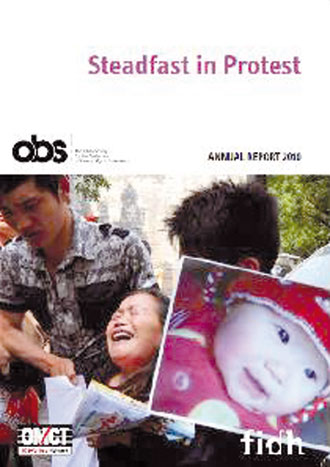
|
 |
 |
|
|
|
|
|
|
|
|
|
|
|
|
|
|
|
|
|
|
|
|
|
|
Bahrain in the Report of the Observatory for
|
 |
Under the political context also, the report pointed to a royal pardon issued in April 2009 to 178 detainees described by the report as political prisoners. Bahrain Human Rights Monitor (BHRM) has been calling for seriousness in dealing with international mechanisms for human rights, including the Human Rights Council and UPR mechanism, and it seems that there is need to remind about this call once again. Because there is a misunderstanding about the nature of the blocked Websites, BHRM suggests that the a?thorities concerned shall issue a list of such sites, and the reasons for their prohibition. Apparently the Judiciary is the right authority to decide the legality of such blockings. This has also been the call of civil society institutions, which have also called to refer the draft new Press Law No. 47 for 2008 to Parliament for adoption after making the necessary adjustments, which include preventing the imprisonment of journalists.
Under the theme of (the continued obstacles to freedom of association), the report of the Observatory for the Protection of Human Rights Defenders pointed out that some associations had to carry out activities without registration, such as the Bahrain Youth Society for Human Rights, the Bahrain Center for Human Rights, and the Committee of the Unemployed. Despite the fact that these institutions operate on the ground, it would have been desirable if there was clarification from the authorities concerned to?international human rights institutions on: why these associations operate without registration, or why the authorities withheld their registration, especially since there are dozens, if not hundreds, of civil society and human rights organizations that have been registered and operating in accordance with the law. We believe that the establishment of more associations and providing them with registration contributes to the promotion and development of society as well as the management of public affairs.
Under the context of (obstacles to freedom of peaceful assembly), the report of the Observatory for the Protection of Human Rights Defenders alluded to considerable restrictions on the organization of peaceful public meetings in 2009, referring to preventing the organization of a seminar on the issue of “political naturalization” process in Bahrain. What is surprising here is the reliance of the Observatory for the Protection of Human Rights Defenders on one incident to confirm restrictions on the freedom ?f peaceful assembly at a time there are great numbers of licensed political societies in Bahrain operating under the Political Associations Law of 2005. Such societies carry out their work freely, hold symposiums and seminars and public gatherings, have headquarters and private media outlets. Furthermore, the issue of naturalization has been thoroughly discussed in many seminars as well as in Parliament. We hoped to see a response from the Bahraini authorities on the issue of preventing the said seminar?on naturalization, in case the Observatory for the Protection of human rights defenders asked for an explanation from the Bahraini authorities.
Under the context of (the use of anti-terrorism laws to prosecute human rights defenders), the report of the Observatory for the Protection of Human Rights Defenders pointed out to the arrest of the “terrorist” cell, which was allegedly planning terrorist operations in Bahrain at the end of 2008. This file has been closed by royal pardon issued by the King of Bahrain on 12 April 2009. At that time the Bahrain Human Rights Monitor (BHRM) had demanded to bring the defendants to fair trials or release them ?mmediately coupled with investigation into any allegations of torture. BHRM renews once again its call to restrict the use of anti-terrorism law and the subjection of all arrests that occur under it to judicial supervision, noting the fact that the anti-terrorism law has been approved by Parliament but the expansion of its use is unacceptable.
Finally, under the context of (judicial harassment of journalists who expose human rights violations), the report of the Observatory for the Protection of Human Rights Defenders pointed out to the prosecutions against two female journalists in 2009 namely; Mariam Sharougi and Lamees Dhaif. The former for publishing an article in al-Wasat daily newspaper in which she criticized discrimination in employment, and the latter for publishing an article in al-Waqt newspaper critical of the personal status sectio? of the judicial system.
The BHRM believes that the time has come to develop a charter of honour between the Bahraini press and the authorities in order to distance the press from prosecution, and enhance the role of the press as a fourth authority, and stresses the right of the press to criticize and fight against corruption, injustice and enhances its role to monitor all organs of the state. Any democratic transition cannot be completed without a strong press that can play its role without fear of prosecution.
In conclusion, there remain questions that need answers from all the parties concerned, including the Observatory for the Protection of Human Rights Defenders about this report, including:
- Did the Observatory for the Protection of Human Rights Defenders conduct a field visit to Bahrain? And, if yes, did they meet a reasonable and varied number of human rights defenders in Bahrain?
- Did the Observatory for the Protection of Human Rights Defenders provide Bahraini officials with a copy of the draft report, as other organizations do, so that the Bahraini authorities concerned could reply to the report content and include such responses in the report before its publication?
- Will the Bahraini authorities concerned discuss the report and swiftly deal with its content?
- Will civil society organizations and human rights societies and human rights defenders engage in objective discussions about the report, including drawing a line and distinction between human rights defenders and other groups?
- Is it high time to enable human rights defenders in Bahrain to exercise their activity and provide protection for them?